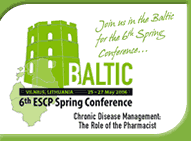 We received this email from the ESCP International Office.
We received this email from the ESCP International Office.6th Spring Conference on Clinical Pharmacy
Join clinical pharmacists from all over Europe (including the new EU countries) to deepen the theme of the ESCP's 6th Spring Conference on Clinical Pharmacy:
Chronic Disease Management: The Role of the Pharmacist
25-27 May 2006, Vilnius, Lithuania
Interact and share knowledge with your peers during 3 days of plenary sessions, round-table discussions, workshops and afternoon plenary lectures on:
The Role of the Pharmacist in the Management of Chronic Cardiovascular Diseases
Current Chronic Diseases Management Concepts
The Role of the Pharmacist in the Management of Chronic Infectious Diseases
A number of critical issues will be developed and discussed. For example, what is the current concept for chronic disease management? Will pharmacists play an active role in the management of chronic cardiovascular diseases or chronic pain in oncology? What rational pharmacotherapy evaluation systems are available and what is the strategy for pharmacotherapeutic-based treatments? How can the pharmacist’s clinical competence be developed? What are today’s practices/experiences in the evaluation (assurance) of rationality in pharmacotherapy? Are there legal differences governing the clinical activity of pharmacists in the EU and other European countries?
Abstract Submission
Do you have findings and expertise to share with your peers? Submit an abstract for consideration within the Poster Discussion Forum, Oral Communications or Poster Sessions.
Abstracts must be submitted on-line by 30 January 2006.
For detailed information about the scientific programme, abstract submission and registration process, please visit the ESCP 6th Spring Conference on Clinical Pharmacy website.
We look forward to receiving your abstract before 30 January 2006. Please also feel free to invite a colleague to share his/her expertise by forwarding this e-mail.
Eduardas Tarasevicius
President of the Conference
Romaldas Maciulaitis
Chair of the Scientific Committee
For more information on abstract submission process please contact:
Eralda Azizaj
Progamme Co-ordinator
ESCP International Office
Avenue de Tervueren 300
B-1150 Brussels, Belgium
Tel: 32-2-743 1542
E-mail: eralda.azizaj@associationhq.com
www.escpweb.org

